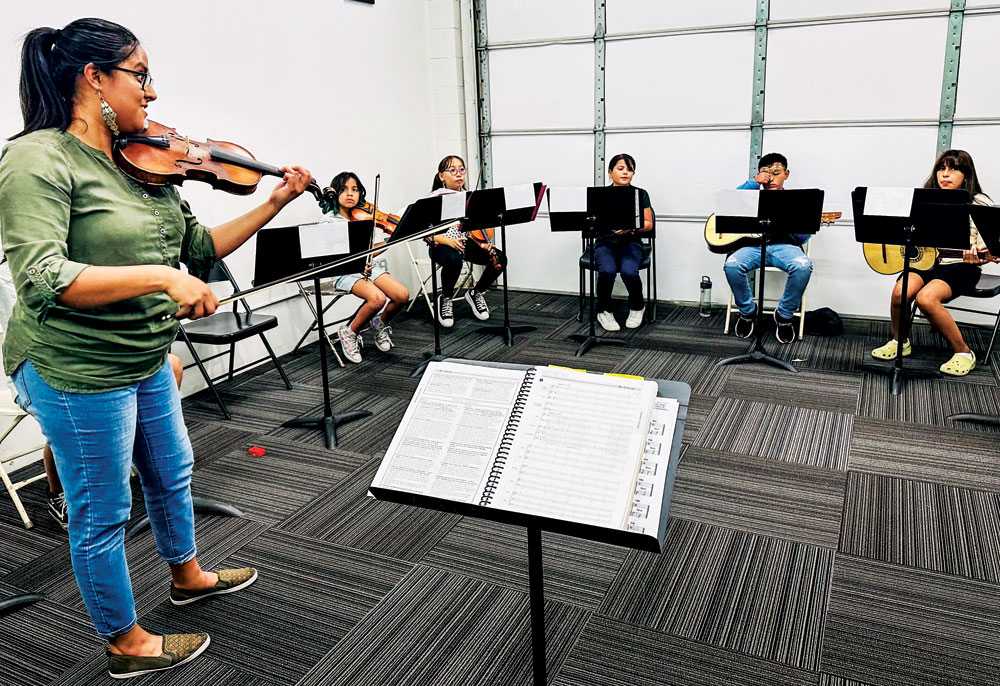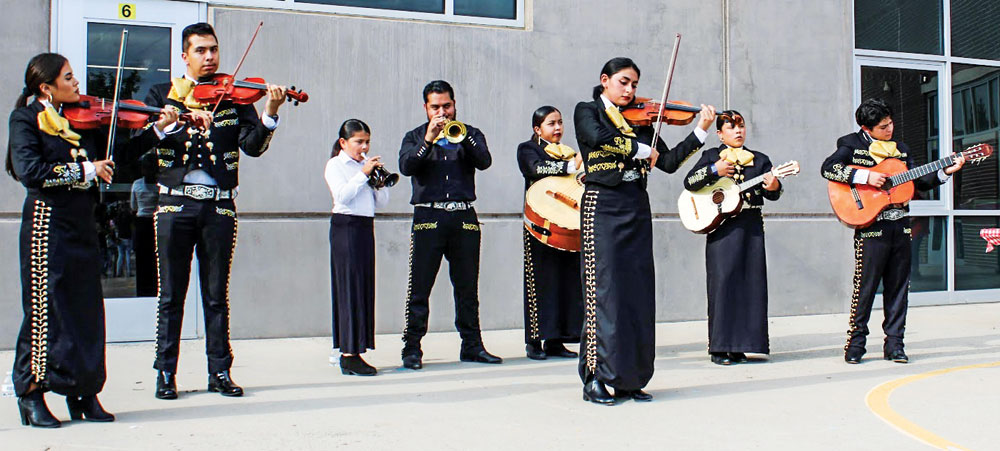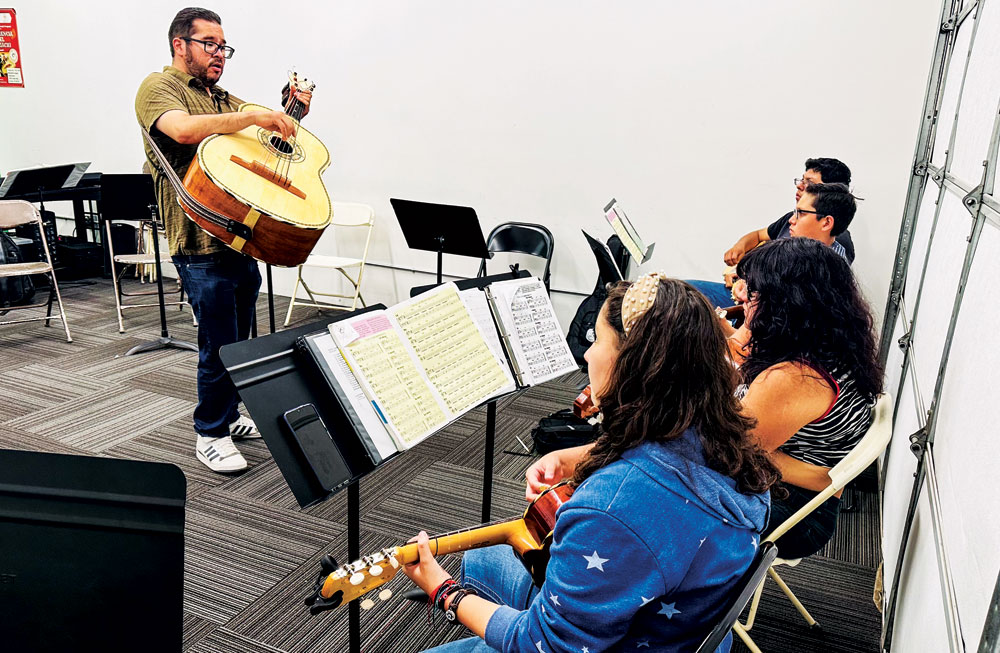
Isahar Mendez-Flores, co-founder of the Colorado Youth Mariachi Program in Aurora, located near Central Park, teaches small group classes that range in age and skill level, allowing personal attention to students. Here, she teaches a class while students follow on instruments that include violin, guitar, and vihuela. Harp and guitarrón are other instruments common in mariachi music. Front Porch photo by Christie Gosch
If you want to hear mariachi music in Mexico City, the Plaza Garibaldi has been the place to go for over a century. Mariachi ensembles walk the plaza in traditional charro outfits, competing for attention and erupting into song when they secure a paying client. Familiar instruments include voice, guitar, violin, and trumpet. These combine with instruments that are less familiar in this country: guitarrón (a large six-string guitar), the vihuela mexicana (a 5-string instrument smaller than a guitarrón), and harp, to create a distinctive sound and typically joyous music.
If you want to hear—and learn—mariachi music in Denver, you only have to go so far as the East Central Park neighborhood in Aurora, home to the Colorado Youth Mariachi Program (CYMP). With a range of classes and opportunities for ages 7-23, CYMP is the realization of a dream for Isahar Mendez-Flores and her husband Victor Becerra. Together they founded the school for which Mendez serves as program director and Becerra as trumpet instructor.

Mariachi Corazón de Oro performing for back to school night at SOAR Elementary School. Photo courtesy of Colorado Youth Mariachi Program
Born in Guanajuato, Mexico and raised in Commerce City in a predominantly Hispanic community, Mendez fell in love with mariachi music after joining her high school’s mariachi ensemble. Becerra, who was born in Zacatecas, Mexico, met Mendez at Adams City High School, where he had taken up the trumpet in 11th grade to play mariachi music.
The music and culture of their high school experiences resonated with them both, but Mendez was alarmed by the high teacher turnover. She estimates that she had five mariachi teachers during her four years in high school. Despite a high Hispanic student population, she was disappointed when she realized that the program was severely under-resourced.
In Texas, Mendez says, mariachi programs are a staple in many high schools, treated with the same high regard as orchestra and band. In Colorado, however, she observed that a lot of mariachi programs would last a year or two and fall apart, due to a lack of institutional support and sustainability. “There’s no way to fund and support a program that represents these students,” says Mendez.

Teacher Luis Madrid demonstrates techniques on his guitarrón, a large bass guitar. Mariachi music is diverse in sound and feel, ranging from romantic boleros to upbeat polkas, and is a powerful representation of Mexican cultural heritage. Front Porch photo by Christie Gosch
She reflects on what is available to students living in low-income communities or Hispanic neighborhoods compared to the options offered elsewhere. “There is no emphasis on quality music education. It’s more about quantity—trying to get the most students access to an instrument,” she says. Beyond putting an instrument in students’ hands, however, the public school programs she saw lacked the capacity to instruct beyond the basics, let alone teach students “how to play their instruments correctly or formally, in a professional setting.”
Understanding first-hand that receiving quality mariachi education was a challenge, she decided in her senior year of high school that she needed to pursue a degree in music education so she could teach people how to teach mariachi.
The first person in her family to attend college, Mendez sought a high-quality music education at Metro State University (MSU). There, she reached out to Prof. Peter Schimpf, who chaired the Department of Music at the time, and made her case for a mariachi music education program since MSU did not offer one. “He was very, very invested in the idea,” says Mendez. They began a student club, and in time created a mariachi curriculum. MSU now hosts an annual Viva Southwest Mariachi Conference and Showcase, in partnership with the Latino Cultural Arts Center. On Sep. 16, the Viva Southwest Mariachi Festival will take place at the Levitt Pavilion, featuring the all-female and Latin Grammy-winning group, Flor de Toloache.
After graduating from Metro State, Mendez and Becerra realized they needed to fulfill their passion for mariachi in a new way. Their dream to teach the next generation in a sustainable program independent of vulnerable public school budgets led to the founding of CYMP. Two years ago, CYMP moved into its current space at 2520 Galena Street, Unit 1. Mendez hopes that community engagement and volunteerism can help them become a permanent fixture in the neighborhood. Mendez teaches as well as runs the non-profit, but she hopes to be able to hire administrative help or find volunteers who might support her fundraising and administrative efforts. She would like to hire an executive director to allow her to focus on programming and curriculum, which is her calling.
She hopes that CYMP makes quality mariachi education available to all. To this end, the school even has an instrument library to reduce barriers to trying an instrument. Ten-year-old Elena does not hesitate when asked about her violin lessons at CYMP:
“I like to learn new things and play mariachi!”
The new semester of classes began Aug. 1, but Mendez welcomes students of all levels to reach out if they are interested in starting classes. Mariachi Corazón de Oro (Heart of Gold Mariachi) is the school’s performance ensemble, with a portion of performance fees returning to the school to sustain its programing.
For more information about classes, to donate to CYMP or to hire Mariachi Corazón de Oro for your event, email isaharcymp@gmail.com. Facebook: @CYMariachiProgram.



0 Comments